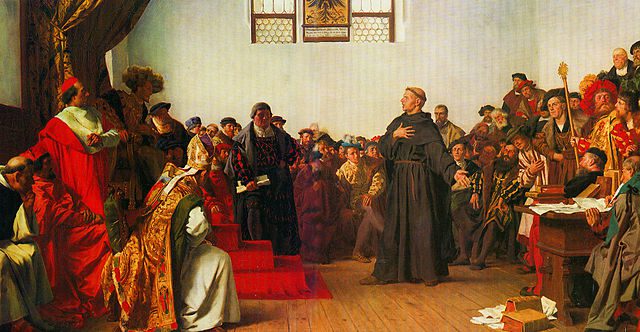
Luther taught the absolute necessity of good works in the Christian life, as an inevitable manifestation of an authentic faith. He didn’t separate justification and sanctification to the degree that Calvin (or even his successor Philip Melanchthon) did.
But Luther also did a very poor job of communicating the subtleties of his “faith alone” (sola fide) soteriology to the masses: most of whom were incapable of analyzing the fine distinctions entailed (a state of affairs which is largely true even to our present time). In his extreme rhetoric of separation of faith and works, the necessary continuing connections that Luther in fact maintained in his theology, rightly understood, were lost in the public mind. In this sense, he showed himself to be rather excessively naive, as to the likely misunderstandings that would result and how many people would act in ways that he neither condoned nor envisioned.
As a result, there was a strong tendency at first towards antinomianism and anarchism (neither sanctioned by Luther) among the populace, as evidenced by an increase of immorality (noted often by Luther himself) and the Peasants’ Revolt.
Now onto Luther’s own words (all the words below, with my blue highlighting and a few added bracketing Scripture references, mostly drawn from other Table-Talk versions). What he states below is scarcely different (if at all) from what St. Paul taught. There are errors elsewhere in his soteriology, assuredly, but I see none here, from an orthodox Catholic perspective.
* * * * *
We must preach the law for the sake of evil and wicked, but for the most part it lights upon the good and godly, who, although they need it not, except so far as may concern the old Adam, flesh and blood, yet accept it. The preaching of the Gospel we must have for the sake of the good and godly, yet it falls among the wicked and ungodly, who take it to themselves, whereas it profits them not; for they abuse it, and are thereby made confident. It is even as when it rains in the water or on a desert wilderness, and meantime, the good pastures and grounds are parched and dried up. The ungodly out of the gospel suck only a carnal freedom, and become worse thereby; therefore, not the Gospel, but the law belongs to them.
The cause that I at the first so harshly spake and wrote against the law was this; the Christian Church was grievously burdened with manifold superstitions and false believings, and Christ was altogether darkened and buried. Therefore I was desirous (through the grace of God, and the Word of the Gospel) to deliver good and godly hearts from such tormenting of consciences; but I never rejected the law.
Anno 1541, certain propositions were brought to Luther as he sat at dinner, importing that the Law ought not to be preached in the church, because we are not justified thereby: at the sight whereof he was much moved to anger, and said, “Such seducers do come already among our people, while we yet live: what will he done when we are gone?” “Let us,” said he, “give Philip Melancthon the honour due unto him; for he teacheth exceeding well and plainly of the right difference, use, and profit of the Law and Gospel. I, also, teach the same; and have thoroughly handled that point in the Epistle to the Galatians. . . . he that taketh the doctrine of the Law out of the church, doth rend and tear away both political and household government; and when the Law is cast out of the church, then there is no more acknowledging of sins in the world: for the Gospel reproveth not sin, except it maketh use of the office of the Law, which is done spiritually in describing and revealing sins that are committed against God’s will and command.”
Philip Melancthon demanded of Luther whether the opinion of Calixtus were to be approved of, namely, that the Gospel of God’s Grace ought to be continually preached. For thereby, doubtless, said Melancthon, people would grow worse and worse. Luther answered him and said: We must preach Gratiam, notwithstanding, because Christ hath commanded it. And although we long and often preach of grace, yet when people are at the point of death they know but little thereof. Nevertheless we must also drive on with the Ten Commandments in due time and place.
*
The Gospel is like a fresh, mild, and cool air in the extreme heat of summer, that is, a solace and comfort in the anguish of the conscience. But as this heat proceedeth from the rays of the sun, so likewise the terrifying of the conscience must proceed from the preaching of the Law, to the end we may know that we have offended against the Laws of God.
*
I do much condemn, said Luther, the Antinomians, who, void of all shame, reject the doctrine of the Law, whereas the same is both necessary and profitable. But they see not the effect, the need, and the fruit thereof. St. Austin did picture the strength, the office and operation of the Law, by a very fit similitude, namely, that it discovereth our sins, and God’s wrath against sin, and placeth them in our sight; for the Law is not in fault, but our evil and wicked nature, even as a heap of lime is still and quiet until water be poured thereon, but then it beginneth to smoke and to burn, not that it is the fault of the water, but it is the nature and kind of the lime, which will not endure water; but if oil be poured upon it, then it lieth still and burneth not. Even so it is with the Law and Gospel. It is an exceedingly fair similitude.
For thus do the Anabaptists teach, that baptism is nothing except the person do believe. Out of this principle must needs follow, that all the works of God be nothing if the man be nothing. But baptism is the work of God, and yet an evil man maketh it not to be the work of God. . . . Who seeth not here, in the Anabaptists, men not possessed with devils, but even devils themselves possessed with worse devils? . . .
If one heresy die, by and by another springeth up, for the devil doth neither slumber or sleep. I myself, which, although I be nothing, have been now in the ministry of Christ about twenty years, can truly witness that I have been assailed with more than twenty sects, of the which some are already destroyed, . . . But Satan, the god of all dissension, stirreth up daily new sects, and last of all (which, of all other, I should never have foreseen or once suspected), he hath raised up a sect of such as teach that the Ten Commandments ought to be taken out of the church, and that men should not be terrified with the law, but gently exhorted by the preaching of the grace of Christ . . . Such is the blindness and presumption of these frantic heads, which even by their own judgment do condemn themselves. . . . let the minister of Christ know that so long as he teacheth Christ purely, there shall not be wanting perverse spirits, yea, even of our own, and among ourselves, which shall seek, by all means possible, to trouble the church of Christ. . . . Yea, let him rejoice in the troubles which he suffereth by these sects and seditious spirits, continually springing up one after another.
(Commentary on Galatians, Lafayette, Indiana, Sovereign Grace Publishers, Inc., 2002, Preface, pp. xxi-xxii)
Related Reading:
Martin Luther: Good Works Prove Authentic Faith [4-16-08]
Luther on Theosis & Sanctification [11-23-09]
*****
Meta Description: Catholics need to be careful to not distort Luther’s true teachings about what “faith alone” means (i.e., it is not antinomianism).
Meta Keywords: Martin Luther, Luther, Mosaic Law, law & grace, Luther’s soteriology, antinomianism, extrinsic justification, Faith Alone, Faith and Works, imputed justification, infused justification, initial justification, Justification, justification by faith alone, Luther & justification, Pelagianism, Protestant soteriology, Salvation, sanctification, semi-Pelagianism, snow-covered dunghill, Sola Fide, soteriology













